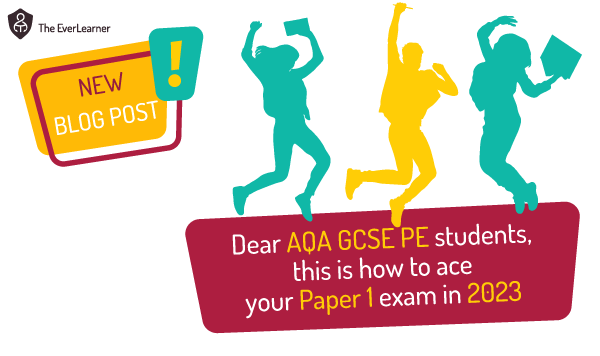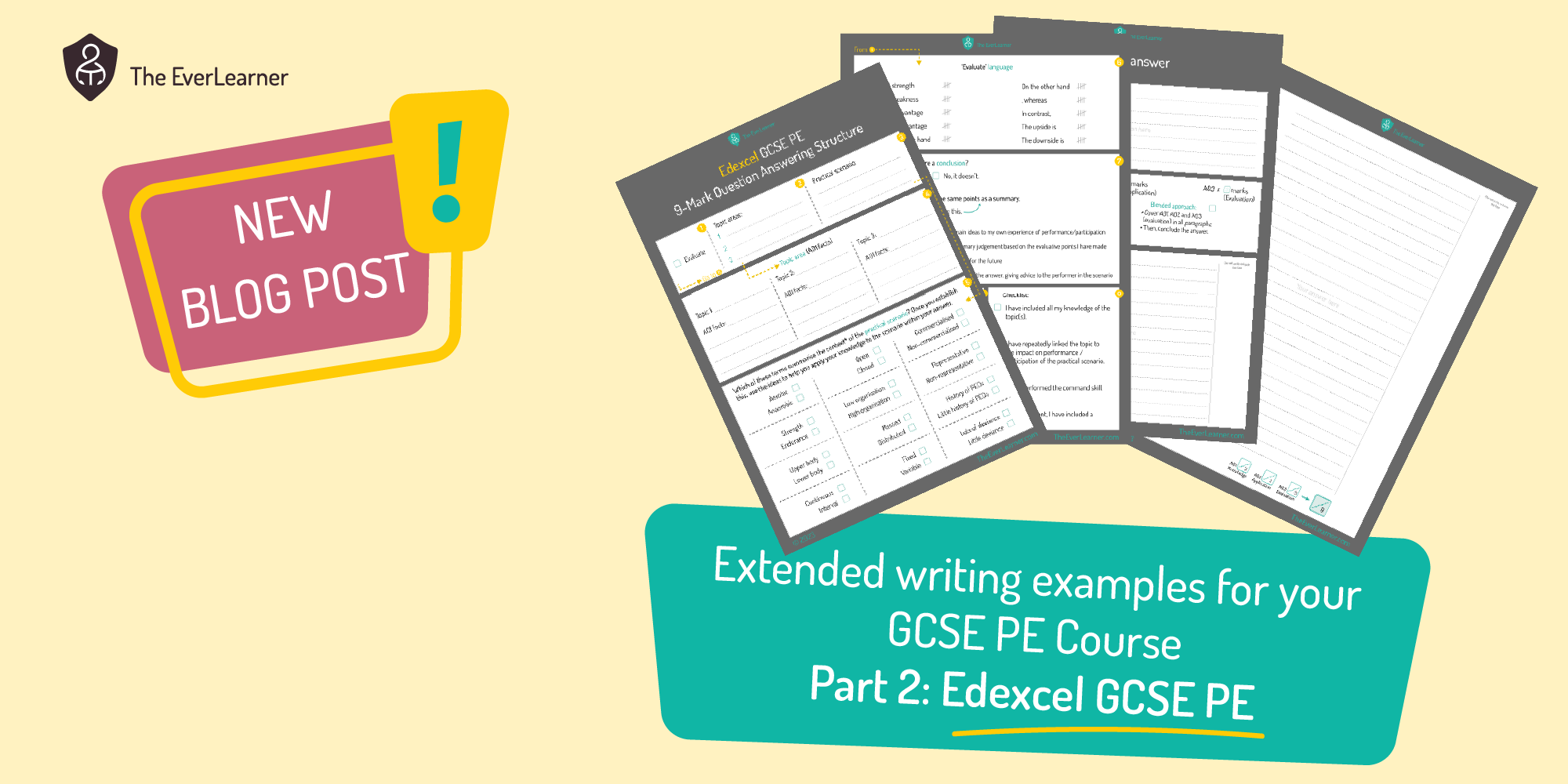Dear Edexcel GCSE PE students, this is how to ace your Paper 1 exam
Dear Edexcel GCSE PE student,
Yes, you! The one reading this post. I wanted to ask for a few moments of your time in order to share with you a few ideas about how to really prepare sharply for your Paper 1 exam.
The Edexcel GCSE PE Paper 1 is a toughie. You know this already but, when rendered down into core elements, it’s really, really achievable.
The aim of this post is to give you 10 ideas that you can use to prepare better for your exam. Follow these guidelines as part of a thorough revision experience and I am confident you will fly.
My 10 top tips:
- Practise a broad range of question types.
- Learn the command terms and what they mean.
- Be prepared to explain.
- Use the E-I-O method when making examples.
- Know Components of Fitness, Fitness Testing’ and Training Methods inside out.
- Use the TEL planning documents for your nine-mark answer.
- Know the new format for the Paper 1 exam.
- Complete and mark the National Mock Exam.
- Learn my model answers.
- Attend my revision sessions in May.
You will notice that none of these top tips involve common-sense advice such as eating well, exercising regularly and getting enough sleep. You don’t need me to tell you these things. Instead, we’ll be focussing on the key behaviours that lead to success.
Top Tip #1 Practise a broad range of question types
Well, this one is pretty obvious. Edexcel asks a wide range of question totals on Paper 1. Take a look at this graph:
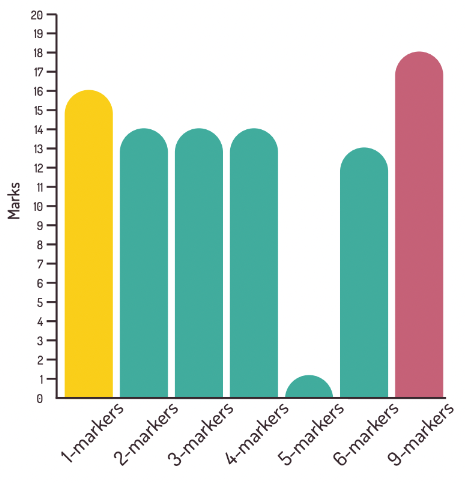 Average mark allocation for all paper 1s since 2018
Average mark allocation for all paper 1s since 2018
Now, it should be noted that the new 2023 Paper 1 structure will change the nature of these averages but, overall, we can see that Edexcel tries to ask a balanced range of question totals across their paper. As your teacher will already have told you, you will only receive one nine-mark question in 2023, compared to there always being two in the past. If you’re unsure about the new paper structure, please read tip 7 below.
There is nothing more impacting that you can do in order to prepare for your Paper 1 exam than to practise and become skilled at writing and marking one-, two-, three- and four-mark questions. If we take the one-markers as a given, this gives you a major focus on two-, three- and four-mark questions.
There are hundreds of examples available for you to practise on. If you do not already have access to ExamSimulator via TheEverLearner.com, speak to your teacher about this. Within this system, there are hundreds of relevant questions for you to engage with.
Top Tip #2 Learn the command terms and what they mean.
It is so easy to think of your exams as testing your knowledge. Well, they do, of course. But your exams (and, in this case, your Edexcel GCSE PE Paper 1 exam) also test your skills.
Take a look here:
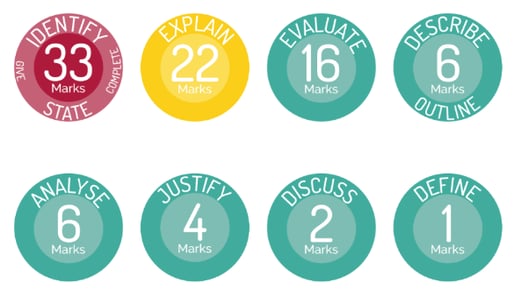 Average skill marks for all Paper 1s since 2018
Average skill marks for all Paper 1s since 2018
And here:
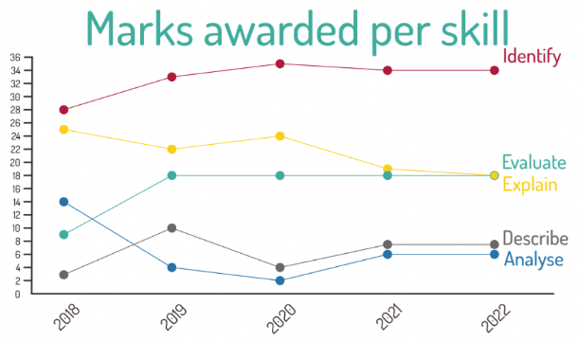 Marks awarded per skill
Marks awarded per skill
The skills that you need to perform have a degree of consistency. Identify (often for one mark) is obvious but take a look at explaining and evaluating. If you are able to really understand the requirements of these skills, you are going to develop an excellent advantage.
So, what do these skills actually mean? Take a look at the table below and start to think about how to respond when asked to develop each different skill. I also encourage you to highlight the skills that appear most commonly on Edexcel GCSE PE Paper 1 exams.
| Command term | Description | Assessment Objectives | ||
| AO1 | AO2 | AO3 | ||
| Identify | It can require a selection from a given stimulus or resource, for example, an option from a multiple choice question or analysis of data from source material such as a graph, or can be synonymous with give/state. | ✔ | ✔ | |
| State | It generally involves the recall of a fact (for example, "State one benefit of...") but it can, when used in relation to a context, be used to determine a learner's grasp of information presented. For example, a data analysis question. It can be synonymous with give/identify. | ✔ | ||
| Give | It generally involves the recall of a fact or an example based on the given stimulus. For example, "Give an example of a specific sporting movement..." It can be synonymous with identify/state. | ✔ | ||
| Define | It requires to give the meaning of a word/term. | ✔ | ||
| Describe | Give an account of something without explanation. | ✔ | ✔ | |
| Compare | Find similarities and differences. | ✔ | ✔ | |
| Explain | Requires a justification/exemplification of a point. The answer must contain some linked reasoning. For example, the format of the response may be "fact...because...therefore..." | ✔ | ✔ | |
| Justify | Give reasons for the answers. This could be a single response to extended writing answers depending on question context. for example "Justify the use of interval training to improve..." | ✔ | ||
| Discuss | Review/analyse information, bringing it together to form a conclusion/judgement based on strengths/weaknesses, alternatives, relevant data or information. Come to a supported judgement of a subject's qualities and relation to it's context. | ✔ | ✔ | ✔ |
| Analyse | Break something down into it's component parts; this could be in relation to movement analysis. | ✔ | ✔ | ✔ |
| Evaluate | Review/analyse information, bringing it together to form a conclusion/judgement based on strengths/weaknesses, alternatives, relevant data or information. Come to a supported judgement of a subject's qualities and relation to it's context. | ✔ | ✔ | ✔ |
Top Tip #3 Be prepared to explain.
As you can see above, explaining is a key skill. Edexcel consider that explaining…
In other words, you need to be able to state “how” and/or “why” for every single topic on the course. Simply knowing a definition or being able to describe a concept well within “explain” responses is not enough.
Let’s take an example. Let’s say I get two different questions about the same topic:
Describe the author of this blog (James).
James is 46 years old, a man and publishes regularly including in his blog.
James is the author because he is an experienced teacher of academic PE and this blog is all about teaching academic PE. This means that James has ideas to share with PE students and teachers. Therefore, he writes meaningful articles with the aim of helping fellow PE teachers and PE students perform better in their PE courses.
Now, if I changed Q2 to “Explain how James blogs,” can you see how the answer would change? Do you agree that we may need to talk about my use of English, my computer, my website and even processes such as getting the articles proofread and a graphic designer making the imagery? Can you see that my answer is specific to the question posed? You need to do this.
If you are asked to explain (which you will be), you must explain! Here’s some language that you should use in your explain responses:
| Explain why... | Explain how... |
| because | through |
| this means | by |
| as a result | via |
| therefore | as a result of |
| the reason for this | caused by |
Just like you prepare for your knowledge, you need to prepare for your skills. I will take this further below.
Top Tip #4 Use the E-I-O method when making examples.
AO2 skills (otherwise known as “making examples”) is the second biggest feature of a successful Edexcel GCSE PE Paper 1 performance:
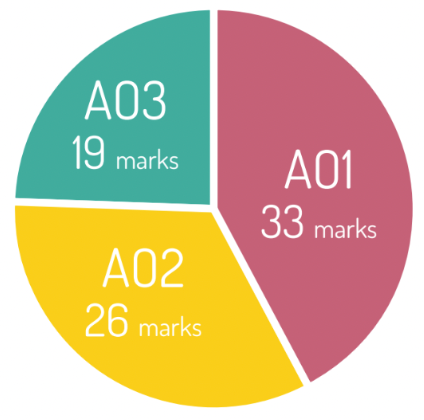 Average marks for AO coverage for all paper 1s since 2018
Average marks for AO coverage for all paper 1s since 2018
On average, 30 marks have previously come from making examples effectively. Therefore, you need to prepare for this and I encourage you to use the E-I-O method. Thankfully, this is nice and simple:
.webp?width=850&height=133&name=image13%20(1).webp)
When you make your example, you MUST state the impact and the outcome of the concept on the example. Let’s take our own example:
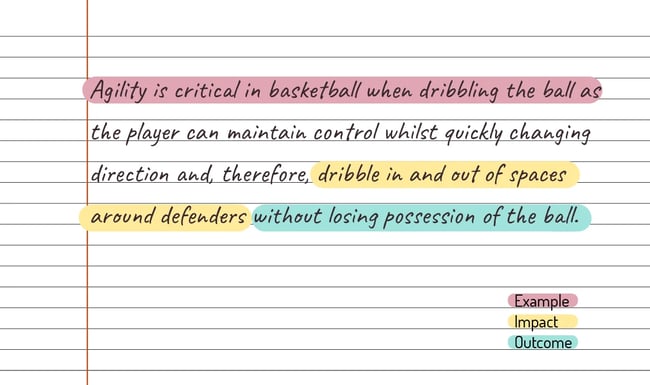
Our author has clearly stated what the example is (dribbling), has stated the impact of the concept/agility and has gone on to state the outcome of the concept. This is the standard I urge you to achieve when making your own examples.
Let’s look at another example from Paper 1:
.webp?width=650&height=385&name=image2%20(1).webp)
In this response, the entire answer is applied to the example using the E-I-O method.
Teachers and students wishing to study the E-I-O method in more detail should visit 100 Practical Examples Part 1, 100 Practical Examples Part 2 and 100 Practical Examples Part 3 of my writing on this topic.
Top Tip #5 Know Components of Fitness, Fitness Testing and Methods of Training inside out.
How can I put this without being accused of predicting your 2023 paper? I guess the only way I can say it is that, by some margin, Components of Fitness, Fitness Testing and Methods of Training have been the most heavily examined topics between 2018 and 2022.
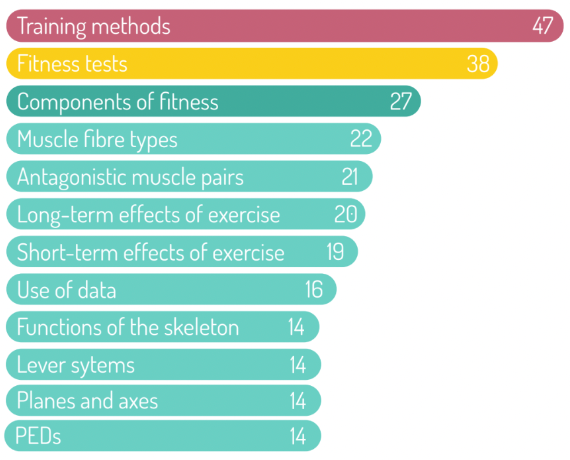 Total marks for most examined topics for all paper 1s since 2018
Total marks for most examined topics for all paper 1s since 2018
Therefore, only a fool would not have these topics absolutely nailed down in preparation for their exam in 2023.
Let’s take them in turn:

We know the following about training methods:
- It has been examined every year so far with substantial marks available on every paper.
- Marks from this topic come from AO1, AO2 and AO3.
- Being able to evaluate the training methods is critical.
So, guess what? This topic and these skills are going to be a central feature of my revision sessions (see tip 10) in May.

We know the following about fitness tests:
- Like Training Methods, Fitness Tests have featured on every paper between 2018 and 2022, with significant marks being available on each occasion.
- A balanced range of skills is required alongside fitness tests but students need to be prepared for AO3 skills.

We know the following about components of fitness:
- Like Training Methods and Fitness Tests, components of fitness have featured on every paper between 2018 and 2022, typically with substantial marks available.
- Most marks available on Components of Fitness come from more than knowledge. In other words, you need to be able to show AO2 and AO3 skills commonly.
With this in mind, I urge you to take part in my utterly free Paper 1 revision in May.
Top Tip #6 Use the TEL planning documents for your nine-mark answer.
As you will probably already know, you will answer one nine-mark extended writing piece in your Edexcel GCSE PE Paper 1 exam. Whilst it is true that two-markers and four-markers carry more total raw marks, it’s really useful to become competent at answering this question because it is the exact area where most students perform less well. Therefore, if you want to mark yourself out and get a better mark than others taking your paper, extended writing is an excellent way to do so:
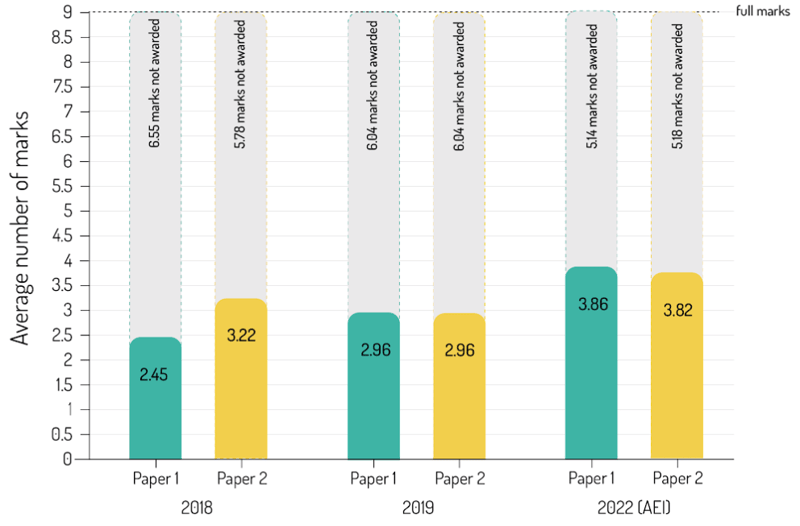
Edexcel GCSE PE Papers 1 and 2 Average marks awarded for 9-mark questions
As you can see from this image, most students fail to achieve most of the marks on nine-mark questions and, if you manage to do so, you can really push ahead of the field.
In order to do that, I strongly recommend that you use my preparation document for the nine-mark writing. Using these resources in preparation for your exam will serve you very well.
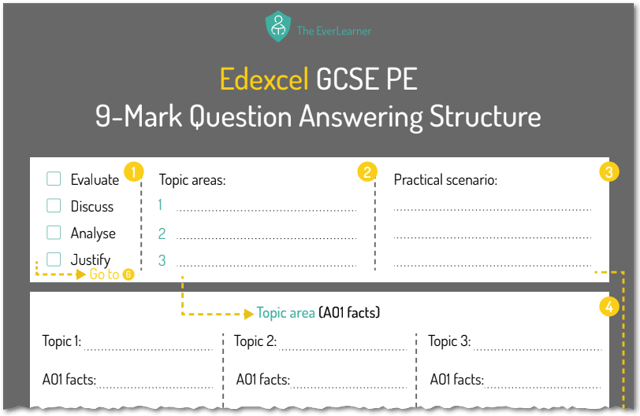 Click to download your own copy
Click to download your own copy
If you are a teacher and are wondering about the best use of these resources, you can watch a webinar I broadcast a few weeks ago entitled "Scaffolding synoptic writing for AQA GCSE students" (it's absolutely fine for you Edexcel people as well).
Top Tip #7 Know the new format for the Paper 1 exam.
Calling all teachers and students of Edexcel GCSE PE: The Paper 1 exam in 2023 is formatted differently than in previous years. Ensure you are aware of this.
I have blogged extensively on this topic in the past and you can read full details in my post entitled "Changes to Edexcel GCSE PE Exams - Will this arrest the slump?". But here is the most important information as a summary:
| Edexcel was: | Edexcel is now: |
| 105 mins | 90 mins |
| 90 marks | 80 marks |
| 0.86 marks per minute | 0.89 marks per minute |
| 2x9-mark extended writing answers | 1x9-mark extended writing answers |
| 20% of marks from extended writing | 11.25% of marks from extended writing |
Edexcel have also stated that Paper 1 will now be split into three specific sections:
| Section A | Section B | Section C |
| Anatomy and Physiology and Movement Analysis | Physical Training | One extended response on physical training |
Section C of Paper 1 (containing the nine-mark question) will only be taken from the Physical Training part of the content (examined in section B). This will provide centres with the opportunity to focus their practice on this area of the course only.
I urge teachers and students to become fully aware of this new structure in advance of May 2023.
Top Tip #8 Complete and mark the National Mock Exam.
As I think you can probably tell, I think about how to perform well on Edexcel GCSE PE Paper 1 quite a lot.
All of my thinking has been put into writing a highly relevant National Mock Exam paper which I published in January 2023. I urge you to speak to your teacher and ask them to download this paper and mark scheme, and to give you the opportunity to answer it, ideally under assessment conditions, before marking it using the mark scheme.
There is quite literally no better preparation for your exam that you can do.
Top Tip #9 Learn my model answers.
On April 28th, I’ll be publishing my model answers to the National Mock Exam for everyone to download and read. I am going to make a very fundamental point about them here: LEARN THE MODEL ANSWERS. I mean, really now, please learn them. The model answers are hyper-relevant to your exam experience this summer and represent the ideal ways to answer all kinds of questions including the skills discussed in many of the points above.
Please, please, please, learn those answers. You will not regret one second of doing so.
Top Tip #10 Attend my revision sessions in May.
And finally… a very, very simple message: I will be broadcasting my live revision show based on all the points made above on Wednesday 3rd May, exactly two weeks before your exam on the 17th.
Folks, I cannot make this clearer: Be there! Whilst I can’t promise you entertainment like Netflix or giggles like going out with your mates, I can guarantee you that this session is delivered with everything I am and will help you massively in your preparations for the exam itself. The revision is utterly free and comes with an entire notes pack as well as the previously published infographics, mock exam, mark scheme and model answers.
BE THERE!!!
Thank you for reading and have a wonderful day.
%20Text%20(Violet).png)
